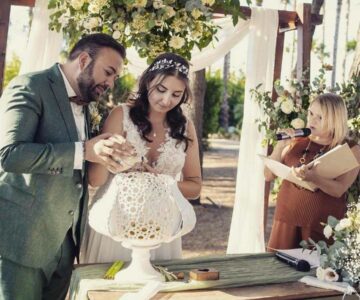How Wedding Celebrants and Wedding Planners Work Together to Create Your Perfect Ceremony
An Interview with Veronica Tasciotti Amati, an Italian Destination Wedding Travel Coordinator
Who is Veronica Tasciotti Amati?
Veronica is a certified Wedding travel coordinator. With an extensive background in the wedding industry, she has a passion for studying and opening new horizons. With the benefit of an academic background in Chinese language, history, and culture, she has lived in China and worked with a Milan-based company organizing events there. After less than a year, she launched her own company: Veronica Amati.
Certification and professionalism are her watchwords, and although in the wedding industry certification is not obligatory, she is firmly convinced that external recognition and validation of professional knowledge and skills are essential, especially for clients coming to Italy from abroad to get married.
Veronica says that if you want to work with international couples, it is essential to keep up to date with the latest trends and be open to new challenges. Getting certified is a sign that you are willing to learn, put your skills to the test, and commit to continuous learning and ongoing training. Veronica is certified as a Wedding Planner, as an Event Manager, and as a Destination Wedding Planner, and she also offers training courses for wedding professionals. Her impressive résumé includes a stint as city councilor for tourism and events in Rome, technical director of tour operators, and wedding planner coordinator.
Q: Is the demand for destination weddings evolving in Italy, and how are wedding planners and celebrants reacting to these changes?
A. Destination weddings, as well as intimate weddings with a smaller group of guests staying over a few days, are on the rise in Italy.
There are several reasons for choosing to get married in another country:
- there are more second-time-round weddings and vow renewals
- couples are looking for a ceremony with a difference
- there is increasing emphasis on the wedding experience and the unique emotional impact of the wedding as a whole.
Couples who choose to get married in Italy — and Italy is one of the most popular destinations for weddings — need to be aware that the market is very uneven. There are Wedding Planners and Celebrants with little or no experience who have never undergone any training and who are not certified.
Increasing the professionalism of wedding and destination wedding planners, as well as celebrants, is an important contribution to the growth of an incredibly important segment of the tourism industry.
Couples will have conducted lengthy research — comparing and contrasting venues, menus, and all the rest — by the time they make their choice, but they may be less aware of the perils of choosing wedding planners and celebrants who are not up to the required standard.

Q. How do celebrants and wedding planners work together?
A. We make it very clear to our couples from the start that they should choose a professional celebrant to create and deliver their personalised ceremony, rather than a friend or a family member, since a celebrant-led wedding is a better guarantee of a successful outcome on the day.
We patiently explain what we do and what the added value of our expertise is. Organizing a wedding is a team effort; every supplier contributes to the success of the entire event. In choosing team members, it is crucial to find vendors with real expertise in their field, with empathy, and with a similar vision to yours. We all need to be on the same page.
Like film directors, we manage and coordinate the entire wedding from first conception to execution. We use our experience and expertise to introduce other professionals to our clients in order to create the best possible team working towards the best possible result on the day of the wedding. Selecting the other members of the team based on our clients’ tastes and personalities, especially choosing the right celebrant for that particular couple, so that a relationship of confidence and trust is established between them from the start, is one of our most important tasks.
The team works well if all of its members work together in perfect sync, and, most importantly, if everyone behaves professionally at all times.
Q: What is you experience of working with celebrants?
A. First of all, I am really happy that the profession has been recognized and standardized through national and international certification. Unfortunately, there are people out there who call themselves celebrants but have no training: they may be actors playing the part or venue employees reading a pre-prepared script.
The national association of celebrants, FederCelebranti, is a valuable filter. With members across the country, the “Find a Celebrant” tool is a great help for wedding planners (or couples) looking for trained, professional celebrants.
I know that one of the goals that FederCelebranti is pursuing is to register certified celebrants so that they can celebrate a civil marriage without having to be delegated by the local mayor. That would be a huge step forward.
Q: Celebrants sometimes feel like a “third wheel” in the relationship between the wedding planner and the couple. How would you suggest creating more synergy between celebrants and wedding planners?
A: Collaborate with other suppliers; do not try to cover more than one aspect of the ceremony. Stay well away from “all-rounders” — suppliers who say they’ll do everything for you, even when those things are not in their skill set. Just to be clear, a wedding planner can never be the photographer, and a celebrant can never be the DJ at the same event.
- all professions should be involved in training
- celebrants could take part in training courses for wedding planners and interact with their associations
- always nurture community, which is more important than individual success — even the most successful wedding planners need a community of professionals
- celebrant associations should be involved in regional projects for destination weddings.

Q: How can you ensure that all your suppliers at a wedding work harmoniously?
A. Harmony is created throughout the wedding planning process, and it is the job of a competent wedding planner to select the right collaborators for that event. The first step is when the wedding planner finds the right celebrant for the couple, having understood the couple’s style and approach and the celebrant’s professional and personal qualities.
There is no one-size-fits-all in this industry. Not all celebrants are suited to all couples. Wedding planners and celebrants establish a relationship based on trust. It will then be up to the celebrant to create a relationship with the couple, equally based on trust. Ultimately, we are all working towards the same goal, which is the successful outcome of the wedding.
Q: What areas of Italy are most popular with foreigners who come here to get married? Where do most couples come from? Have you ever had any unusual requests?
A: The majority of couples come from the US and the UK, but there are many German, Belgian, Dutch, and Scandinavian couples too. Indian and Asian couples are also on the rise. Then, we have a lot of mixed marriages, where spouses come from different countries, or Italians who have met their “other half” abroad or who work outside Italy and come back home to get married.
One of my most unusual weddings was for a Chinese couple. The ceremony was celebrated in Italian, English, Mandarin Chinese, and Cantonese. I once had a request for an Etruscan-style wedding. At a wedding for two Norwegians, I found out I needed to calculate seven hours for the dinner because every guest is supposed to give a speech with no time limit!
Q: Do Chinese couples come to Italy to get married?
A: The Chinese often plan a pre-wedding here, which to all intents and purposes is a photo shoot. Since I was specializing in Chinese weddings, when I found out that couples were bringing their own photographers and makeup artists from China, I decided to offer training courses for Italian professionals on the customs, habits, type of images, and makeup that Chinese brides and grooms want. We have the best photographers and makeup artists in the world here in Italy, so it was simply a matter of teaching them what Chinese couples want when they come to Italy for a pre-wedding. Then I went back to China, and showed my couples that it was no longer necessary for them to bring a photographer or a makeup artist from China to Italy!
Q: What skills should a destination wedding celebrant possess, in your view?
A: For a destination wedding celebrant, it is essential to:
- know the language
- know the culture
- study the cultural and social background of the couple
- study the clients as a couple, as individuals; as people
- know the couple’s specific traditions and family hierarchy: for example, in China, grandparents are more important than parents
- find out what traditions the couple wishes to bring to the ceremony from their country of origin
- find out which people are important to involve or address during the ceremony
Q: For a foreign couple's wedding, is it always preferable for the celebrant to officiate in the couple's language? Do interpreters pose an obstacle?
A. It is certainly preferable for the celebrant to know the languages of the bride and groom, otherwise the ceremony is too long. There is a “flattening” effect on the emotional impact of the ceremony when a translation is read by an interpreter. Repeating the words of a ceremony twice, first in one language and then in another, reduces the level of attention and involvement of those present, makes things less spontaneous, heavier, less fluid.
A celebrant who speaks the language(s) can write the ceremony directly, choosing which parts to translate, or using different words in different languages to modulate the emotional impact of the words according to who is listening to them.
Of course, if the marriage is legally valid with a civil ceremony, the presence of an interpreter is mandatory if the couple does not understand Italian.
Q: Is it customary for wedding planners to charge a finder’s fee for the celebrant?
A. As consultants to the couple, wedding planners should never charge a fee for the suppliers they suggest for the wedding. In any case, it should always be specified in the contractual agreements.
In my view, professional wedding planners should be paid for their work and should not accept commissions for other people’s work. If anything, it would be better to give our clients a small discount rather than paying a commission.
Q: Requests for weddings come from private couples, wedding portals and wedding planners. How should celebrants make themselves known?
A. I suggest:
- at the outset, propose free collaborations to vendors in exchange for visibility or materials
- present yourself at your best, investing in yourself and your professionalism
- use Instagram for impactful images
- use Facebook to post longer texts, descriptions and to go into more detail
- use Linkedin, a network of professionals, to post more articulate and complex content and long articles
- Make sure you are always tagged with your correct name or logo
- demonstrate professionalism in everything you do
Q: We celebrants study the profiles of wedding planners to figure out how to work with them. In addition to approaching FederCelebranti, and trusting our celebrant portal, how do you wedding planners select a celebrant?
A. We study celebrants in detail. We start by checking out celebrant websites, videos and Instagram profiles, then we check with the venues and maybe ask our colleagues about how you interacted and worked together. As I have said before, if the celebrant is certified, it is the best guarantee for the clients.
The wedding professionals, whether it’s us wedding planners or you celebrants, must become points of reference for foreigners.
(Veronica Tasciotti Amati)



